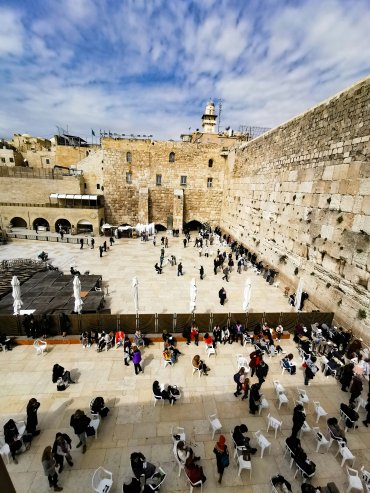
Avinu, Malkeinu: What If You Hate Your Father And Are Terrified Of Your King?
Avinu, Malkeinu, one of the most famous High Holiday prayers, beseeches the Almighty – with whom we refer to in two ways – Father and King – to inscribe us in the Book of Life.
Our Father our King
inscribe us in the book of good life.
Our Father our King
inscribe us in the book of redemption and salvation.
A common explanation that is given on why we refer to God in two ways is that we can choose to make Him distant, like an all-powerful king or close and loving, like a father. This is a meaningful idea in general, but this dynamic falls apart for many of the people we see at Makom.
The awe that we’re meant to feel for our King, is replaced with absolute terror, as so many of the people who come to Makom were raised to envision a God who metes out harsh punishment in this world for any of their shortcomings, and then delights in their suffering.
The love they should feel from their father and to their father, unfortunately, for so many members is lacking due to abusive and dysfunctional relationships at home.
It is a common idea among mental health professionals that the way we relate to our parents in this world impacts our relationship with our Parent in Heaven. For someone not observant who never considered God much, if they have a good relationship with their parents, developing a positive one with the Almighty often comes naturally.
But what can you do when both the symbols of God and God Himself are horrible associations to a person? How can that be repaired? I worried very much about this dynamic as we were establishing Makom and wasn’t sure how we’d help our members overcome something that seemed insurmountable.
What we’ve discovered in the two years since we slowly started making Shabbos placements is that there is a third being that can be added into the mix of “Avinu, Malkeinu” – the adopted parent.
Our Shabbos hosts, who offer warm, loving, non-judgmental havens for our members to escape to over Shabbos, who model healthy and happy marriages, parent child interactions and an authentic love of Judaism is the missing link that is allowing so many of our members to feel loved and to love “parents” in this world.
Slowly, slowly, this new relationship is causing many of them to repair their relationship to their Parent in Heaven. What this means is that no matter how bad things start out in life, the possibility of reconciling with the Almighty is always there. A person’s narrative can change, even if a negative outcome seemed set in stone.
As a kid, I imagined Heavenly Scales during the High Holidays. If I had enough good merits, I’d tip them and be written and sealed for another year of life. If, God forbid, I fell short, I’d end up in the other book.
While Rosh Hashana is certainly the Day of Judgment, and our year to come is determined at this time, perhaps the “inscription” we say in our prayers can mean something additional. Something much more literal. Perhaps, like characters in a book, we are asking God to write new stories for us, from sad and painful ones to happy and hopeful ones. Perhaps we are not just asking for another year of life, but to have the story of our life be included in the book where life is good, full redemption and salvation.
If you found this content meaningful and want to help further our mission through our Keter, Makom, and Tikun branches, please consider becoming a Change Maker today.








2 comments
Sort by
This is so beautiful! The work you’re doing is amazing. Maybe someday I’ll try a shabbos placement and have my negative association repaired.
Thanks, Penina. If you ever want to give this a try, we are here for you. You can sign up at ProjectMakom.org